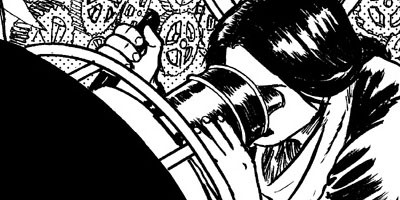
Click on thumb to see full
As always, you can also go to the dedicated Al’Rashad site.
1
Jul

As always, you can also go to the dedicated Al’Rashad site.
26
Jun
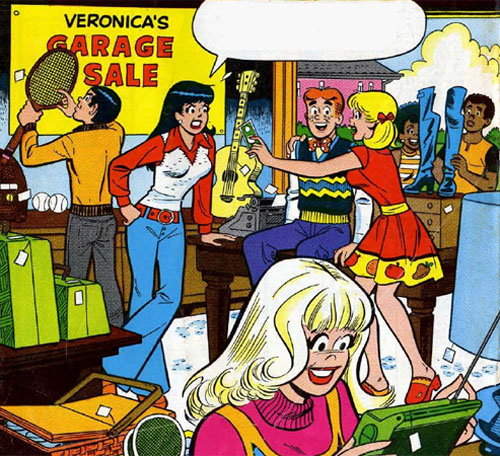
25
Jun
In its long, storied existence, ‘Dragon Magazine’ really did a lot to create “gaming humor” as a legitimate subgenre. Think of all the great tabletop gaming comics out there, from ‘Yamara’ to ‘What’s New With Phil and Dixie’ to ‘Dork Tower’ to ‘Knights of the Dinner Table’, and odds are they showed up in ‘Dragon’ at least once. A lot of online comics like ‘Order of the Stick’ wouldn’t be around if not for pioneering strips that said, “Yes. Fantasy is weird and people rolling dice to make it up is even weirder. But isn’t it awesome?”
‘Nodwick’, which also has its roots in ‘Dragon Magazine’, is a comic not so much about the tropes of gaming as about the tropes of the kind of fantasy universe you’d get if the rules of physics were supplanted by the rules of gaming. The heroes are a band of not-too-bright, not-too-heroic adventurers who are more interested in killing monsters and getting swag than in actually doing the right thing. They have one truly good person, the team cleric, but even she has her little blind spots…namely, her belief that healing magic and resurrection spells make it not such a big deal when the group’s fetch-and-carry-and-walking-trap-detector henchman, Nodwick, gets badly mauled on account of being the only person who isn’t an adventurer.
Mind you, he’s also the only person with a drop of common sense, which is where the humor comes in. Nodwick frequently saves the day by being the one who spots the intelligent, easy solution that nobody comes up with because they’re all too busy being fantasy heroes and trying to find the official, genre-sanctioned solution. And even when he can’t get out of the obvious and terrible fate awaiting him (thank goodness for magical healing duct tape!) he acts as a Greek chorus, commenting on the absurdity of the way fantasy tropes work.
But the sneaky thing about ‘Nodwick’ is the way that Aaron Williams slides an actual story into things, right under your nose. Silly villains like the exiled god Baphuma’al eventually become serious antagonists, goofy MacGuffins like Piffany’s first kiss become important plot points, and the whole thing builds to a surprisingly epic finale. Williams is a master at this kind of backdoor worldbuilding (see his superhero comic, ‘PS238’, for another example), and you’re so busy laughing that you don’t even see it coming. When he gives unlimited cosmic power to a hamster who’s also the President-for-Life of the Henchman’s Guild, that’s funny. When said hamster becomes instrumental to the final battle between Good and Evil for the sake of the universe, that is freaking METAL.
I don’t want to get too much into detail about ‘Nodwick’, because the best par of humor is experiencing it for yourself for the first time, so…just take my word for it. ‘Nodwick’ is funny. And it’s also good.
24
Jun
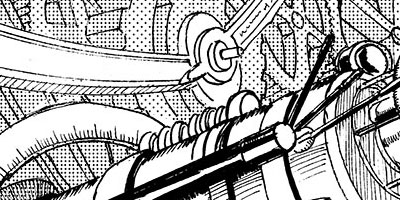
As always, you can also go to the dedicated Al’Rashad site.
18
Jun
Jim already covered a lot of ground yesterday, a lot of which I concurred with and sort of pre-empted chunks of my post, but I’ve got a few things to say (spoilers after the cut).
17
Jun
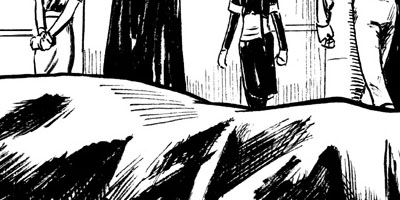
As always, you can also go to the dedicated Al’Rashad site.
11
Jun
10
Jun
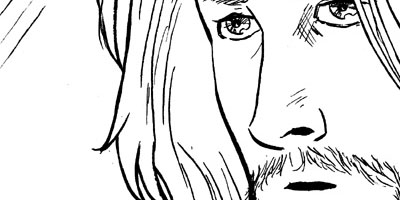
As always, you can also go to the dedicated Al’Rashad site.
5
Jun
3
Jun

As always, you can also go to the dedicated Al’Rashad site.
2
Jun
The logic in my head went thusly:
1. Edward Norton was utterly wasted in ‘The Incredible Hulk’, a movie about a man with a split personality who was destructive and at odds with his ‘primary’ self.
2. Prior to that, Norton was probably best known for ‘Fight Club’, a movie about a man with a split personality who was destructive and who (came to be) at odds with his primary self.
3. Previous Hulk stories have featured the Hulk at varying levels of intelligence. You could, without betraying the source material, write a Hulk who was as eloquent and charismatic as Tyler Durden. And the potential for stunt-casting with Brad Pitt would be too hard to pass up. In some alternate universe, we got a version of ‘The Incredible Hulk’ written as a superhero homage to ‘Fight Club’.
4. When writing dialogue from this alternate Hulk movie, it’s worth remembering that Hulk dialogue is always funnier when written in Roy Thomas’ green Hulk argot.
As such…
“First Rule of Hulk Club: Hulk not talk about Hulk Club.”
“Second Rule of Hulk Club: HULK NOT TALK ABOUT HULK CLUB! RRRAAAARRRRGGGGH!”
“Third Rule of Hulk Club: When puny human say ‘stop’, go limp, tap out, Hulk stop smashing them.”
“Fourth Rule of Hulk Club: It not fair to gang up on Hulk.”
“Fifth Rule of Hulk Club: Hulk will smash you when Hulk finished smashing other puny human.”
“Sixth Rule of Hulk Club: No shirts. No shoes. Only purple pants.”
“Seventh Rule of Hulk Club: Hulk will smash as long as Hulk has to smash.”
“And Eighth Rule of Hulk Club: If this your first night at Hulk Club…you must SMASH!”
29
May
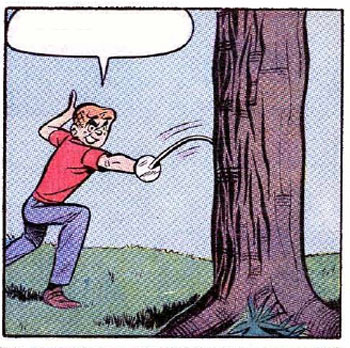
27
May
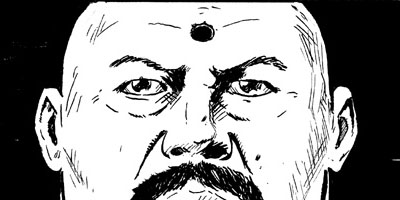
As always, you can also go to the dedicated Al’Rashad site.
21
May
In email, Michael Paciocco asks:
So, I’m reading this.
And there’s a lot of reference and reverence for the “Five Years Later” Legion stuff. Which is sort of before my time (didn’t even start reading DC regularly until post-Zero Hour – exceptions being Waid’s Flash, the Superman stuff, and the beginning of the Kyle Rayner era). As the biggest Legion guy I know, would you mind explaining it to me because I don’t get it.
From what I’ve read in bits and pieces from blogs and everywhere else, the 5YL is the Legion’s “Grim and Gritty” phase – the UFP is more Dystopic, Cosmic Boy’s lost his powers, the Legion is basically shattered, Richard Kent Shakespeare, Shrinking Violet has a bionic leg or something, etc etc. And then there’s whole thing where they find a bunch of bright and happy clones (who may or may not be the real deal) and Earth is destroyed? How does that not conflict deeply with the whole thing of “LOSH should be bright and happy and heroic”?
The first thing you have to understand about the v4 era Legion is that it was almost certainly one of the most ambitious superhero comics undertakings of all time. The blogpost Michael references rightly describes it as a “post-Watchmen comic book” in the proper sense, which is to say it took away far more in the storytelling toolkit from Watchmen than simply the grim tone. Indeed, calling v4 “grim and gritty” oversimplifies it greatly; after all, this is a run which had some of the greatest comedy issues of all time.
What Keith Giffen took from Watchmen was the concept of whole-world-building and the idea that the greater world beyond one’s protagonists matters, but his use of it was expressly in opposition to the core thesis Alan Moore advanced, which is that, all things considered, superheroes in and of themselves are basically powerless to stop society’s self-destructive urges (Dr. Manhattan is only a stopgap, Nite Owl and Rorshach are meaningless, and Ozymandias only succeeds because he abandons superheroism for conspiratorial means). v4 Legion, in comparison, is set against the backdrop of a full-fledged galactic war between numerous enormous space empires – the United Planets, the Khunds, the Dominion, the Dark Circle, et cetera – but time and again, the Legion mostly succeeds in its goals. Where it does not are usually disasters of immense scope rather than the result of others’ agency.
As comics have grown more cognizant of the belief that superheroes could only “realistically” operate as agents of state authority (see the Marvel Universe, where currently most of the major superhero teams either are explicitly state agents like the Avengers or operate on a wink-nod basis with the state), Giffen’s Legion went entirely the other way: he had the Legion reform under conditions as hostile as possible, with only their own resources keeping them afloat (and although Chameleon was at this point ridiculously wealthy, the series made clear that individual wealth really only goes so far more often than not) and with most of the established power actors either disinclined to cooperate with the Legion or actively hostile towards their re-inception. It’s an overwhelmingly pro-superheroic, deeply idealistic run of comics. To call it “grim and gritty” because a lot of characters die misses the point – after all, the series takes place mostly within a war, and whenever the focus shifts away from those wars, the most striking thing about the story is how much care it takes to show that the Legion is an extended family more than anything else.
And, as a writing accomplishment – getting back to the technical side of things – even though it does not entirely succeed (Giffen tries to juggle an enormous number of balls, and frankly he drops a few here and there) it is staggering in its scope. What Giffen did (along with the Bierbaums, who I think at this point are widely acknowledged as being the weaker writers in the v4 team, particularly when their eventual run without Giffen was so much… less than his) was to apply Watchmen‘s use of wider-world story to the Legion universe – IE to apply it to over thirty years of comics. Giffen had done this before with Paul Levitz, of course (see the Great Darkness Saga and the Legion of Super-Villains story, both of which were massive callbacks to practically the entirety of Legion history) but v4 is so dense at times it practically begs for annotations – not that they are necessary, for the most part, to follow the vast and ambitious swirling plot. And Giffen did all of this while creating a new status quo to explain how the Legion came to be in a universe where Superboy was never a member to boot (a task at which he was mostly successful, creating Laurel Gand in the process – a Supergirl replacement who became quite popular in her own right).
It doesn’t entirely succeed. Some elements were controversial at the time because neckbeards hate change (the Ayla/Vi gay relationship, the Shvaughn/Sean Erin de-transgendering story, Sun Boy’s character arc). Some elements were controversial because they just sucked (Kid Quantum, a bad idea all around). But on the whole it is far more successful than not, and where it fails it is forgivable because of the furious attempt by Giffen and his co-creators to do something new in superhero comics. And that is worth commemorating.
20
May
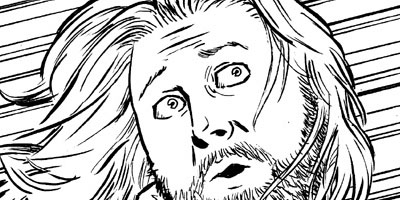
As always, you can also go to the dedicated Al’Rashad site.
"[O]ne of the funniest bloggers on the planet... I only wish he updated more."
-- Popcrunch.com
"By MightyGodKing, we mean sexiest blog in western civilization."
-- Jenn
